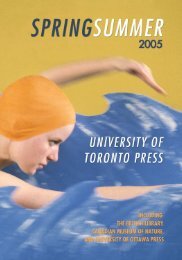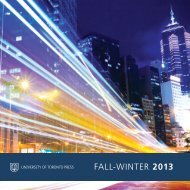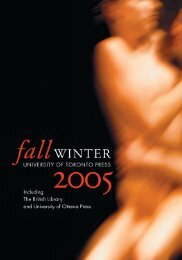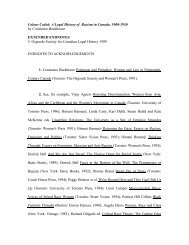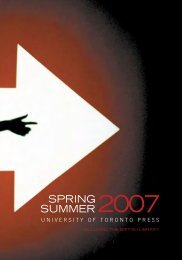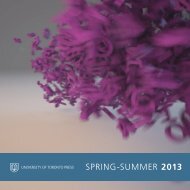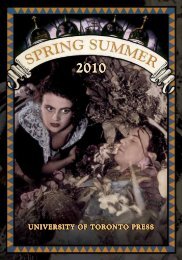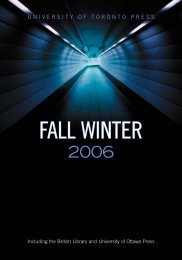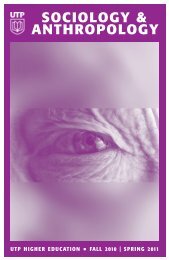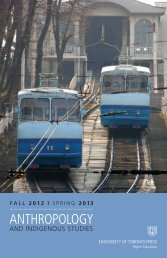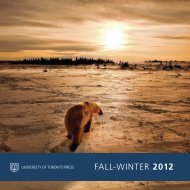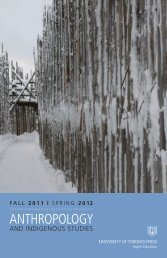Classics, Medieval & Renaissance 2012 - University of Toronto ...
Classics, Medieval & Renaissance 2012 - University of Toronto ...
Classics, Medieval & Renaissance 2012 - University of Toronto ...
You also want an ePaper? Increase the reach of your titles
YUMPU automatically turns print PDFs into web optimized ePapers that Google loves.
LITERATURE<br />
NEW<br />
The Biblical Dante<br />
V. Stanley Benfell<br />
The Biblical Dante explores Dante’s understanding<br />
<strong>of</strong> biblical truth and its significance for the poet and<br />
his readers. In this work, V. Stanley Benfell presents<br />
a series <strong>of</strong> close readings <strong>of</strong> passages where Dante<br />
not only cites the Bible extensively, but also explicitly<br />
considers its status as scripture and as a true text.<br />
In the first part <strong>of</strong> the study, Benfell examines<br />
some <strong>of</strong> Dante’s minor works and the Paradiso to<br />
show how his notion <strong>of</strong> textual truth differs markedly<br />
from our present-day conceptions. In the second<br />
part, Benfell turns to the Commedia’s first two canticles,<br />
where Dante’s vision for a just society is put forth more<br />
overtly, and his use <strong>of</strong> the Bible is key to revealing that<br />
vision.<br />
V. Stanley Benfell is an associate pr<strong>of</strong>essor in the<br />
Department <strong>of</strong> Humanities, <strong>Classics</strong>, and Comparative<br />
Literature at Brigham Young <strong>University</strong>.<br />
‘I learned a great deal from The Biblical Dante, a<br />
major contribution to the field <strong>of</strong> Dante studies.<br />
Each <strong>of</strong> the chapters in this book is strong, combining<br />
thoughtful analysis with insightful close reading.’<br />
William Stephany, <strong>University</strong> <strong>of</strong> Vermont<br />
(<strong>Toronto</strong> Italian Studies)<br />
336 pp / 6 x 9 / 2011<br />
Cloth 978-1-4426-4274-4 $75.00 (£52.99)<br />
NEW<br />
Dante and Augustine<br />
Linguistics, Poetics, Hermeneutics<br />
Simone Marchesi<br />
At several junctures in his career, Dante paused to<br />
consider the process <strong>of</strong> writing and what it means<br />
to be a writer: How does language, in particular<br />
‘poetic language,’ work Can poetry be translated<br />
What is the relationship between a text and its commentary<br />
Who controls the meaning <strong>of</strong> a literary<br />
work In Dante and Augustine, Simone Marchesi<br />
re-examines these questions in light <strong>of</strong> the influence<br />
that Augustine’s reflections on similar issues exerted<br />
on Dante’s sense <strong>of</strong> his task as a poet. Marchesi<br />
goes beyond traditional inquiries, allowing Dante to<br />
emerge as a versatile thinker, committed to a radical<br />
defence <strong>of</strong> poetry and yet always ready to reconsider,<br />
revise, and rewrite his own positions on matters <strong>of</strong><br />
linguistics, poetics, and hermeneutics.<br />
Simone Marchesi is an associate pr<strong>of</strong>essor in the Department<br />
<strong>of</strong> French and Italian at Princeton <strong>University</strong>.<br />
‘Dante and Augustine delights as a well-constructed,<br />
elegantly argued, and intellectually coherent study<br />
<strong>of</strong> Dantean ideas through the lens <strong>of</strong> Augustinian<br />
theory.’<br />
Teodolinda Barolini, Columbia <strong>University</strong><br />
(<strong>Toronto</strong> Italian Studies)<br />
304 pp / 6 x 9 / 2011<br />
Cloth 978-1-4426-4210-2 $70.00 (£48.99)<br />
NEW<br />
Dante’s Tenzone with Forese Donati<br />
The Reprehension <strong>of</strong> Vice<br />
Fabian Alfie<br />
Dante’s poetic correspondence (or tenzone) with<br />
Forese Donati, a relative <strong>of</strong> his wife’s, was rife with<br />
crude insults: the two men derided one another<br />
on matters ranging from sexual dysfunction and<br />
cowardice to poverty and thievery. Rather than disregarding<br />
this correspondence, in his Commedia<br />
Dante repeatedly acknowledged and evoked the<br />
memory <strong>of</strong> his youthful put-downs.<br />
Dante’s Tenzone with Forese Donati explores<br />
the lasting impact <strong>of</strong> these early sonnets on Dante’s<br />
writings and Italian literary culture, notably in the work<br />
<strong>of</strong> Boccaccio. Fabian Alfie examines derision as an<br />
ethical dimension <strong>of</strong> literature that both facilitated<br />
the reprehension <strong>of</strong> vice and encouraged ongoing<br />
debate about the true nature <strong>of</strong> nobility.<br />
Fabian Alfie is a pr<strong>of</strong>essor <strong>of</strong> Italian in the Department<br />
<strong>of</strong> French and Italian at the <strong>University</strong> <strong>of</strong> Arizona.<br />
‘This is first-class philological scholarship – substantial,<br />
erudite, and enduringly valuable.’<br />
Steven Botterill, <strong>University</strong> <strong>of</strong> California at Berkeley<br />
(<strong>Toronto</strong> Italian Studies)<br />
240 pp / 2 illustrations; 14 charts / 6 x 9 / 2011<br />
Cloth 978-1-4426-4223-2 $55.00 (£38.99)<br />
34 <strong>University</strong> <strong>of</strong> <strong>Toronto</strong> Press



